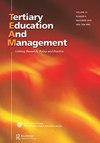The societal role of universities and their alliances: the case of the EuroTeQ Engineering University
IF 1.6
Q2 EDUCATION & EDUCATIONAL RESEARCH
引用次数: 0
Abstract
Abstract We analyse the creation of European university alliances as an effort to build learning networks between universities in light of newly perceived needs in Europe. The rationales for such alliance formation include cultural integration, grand societal challenges and reforms in the European innovation ecosystem. We consider how alliance formation may be instrumental in achieving closer cooperation and understand alliances as learning networks where universities can share know-how, define strategies and pursue moral reflection. How such learning may take place is illustrated with a case study of the “EuroTeQ Collider”, a joint educational programme by one of the European university alliances. The case illustrates how uneven experience with novel educational formats and stakeholder engagement creates opportunities for exchange and how formulating a common language for joint activities can make universities align their strategies and deliberation.大学及其联盟的社会角色:以欧洲teq工程大学为例
摘要:我们分析了欧洲大学联盟的创建,作为根据欧洲新认识的需求在大学之间建立学习网络的努力。这种联盟形成的理由包括文化融合、重大的社会挑战和欧洲创新生态系统的改革。我们考虑联盟的形成如何有助于实现更紧密的合作,并将联盟理解为大学可以分享技术诀窍、制定战略和追求道德反思的学习网络。通过“EuroTeQ对撞机”的案例研究说明了这种学习是如何进行的,“EuroTeQ对撞机”是一个由欧洲大学联盟之一发起的联合教育项目。该案例说明了在新型教育模式和利益相关者参与方面的不平衡经验如何创造交流机会,以及如何为联合活动制定共同语言可以使大学协调其战略和审议。
本文章由计算机程序翻译,如有差异,请以英文原文为准。
求助全文
约1分钟内获得全文
求助全文
来源期刊

Tertiary Education and Management
EDUCATION & EDUCATIONAL RESEARCH-
CiteScore
3.00
自引率
0.00%
发文量
15
期刊介绍:
Tertiary Education and Management (TEAM) is an international, interdisciplinary and peer-reviewed journal that welcomes research contributions that reflect upon, study or question main developmental trends and practices, and address current and future challenges in higher education. The thematic focus of TEAM includes management, governance and organisation of higher education; teaching and learning in higher education; the academic profession and academic careers; higher education and the labour market; and institutional research in higher education. TEAM is jointly published by Springer and EAIR – The European Higher Education Society, and is intended to contribute to EAIR’s mission of creating a better linkage of research, policy and practice in higher education.Articles submitted should as a consequence be written for, understood by, and be relevant for a multicultural, multifaceted and international audience, consisting of both the international academic community and the field of practice within higher education. TEAM welcomes articles using a variety of approaches, methods and perspectives given that the article demonstrate the relevance of the research in a broader context whether this be in other higher education institutions, other national settings or in the international arena. Occasionally, the journal also publishes articles where personal viewpoints/experiences or political arguments are made to stimulate discussion and reflection, or to challenge established thinking in the field of higher education. Such pieces are published in a dedicated ''Forum'' section of the journal.
 求助内容:
求助内容: 应助结果提醒方式:
应助结果提醒方式:


